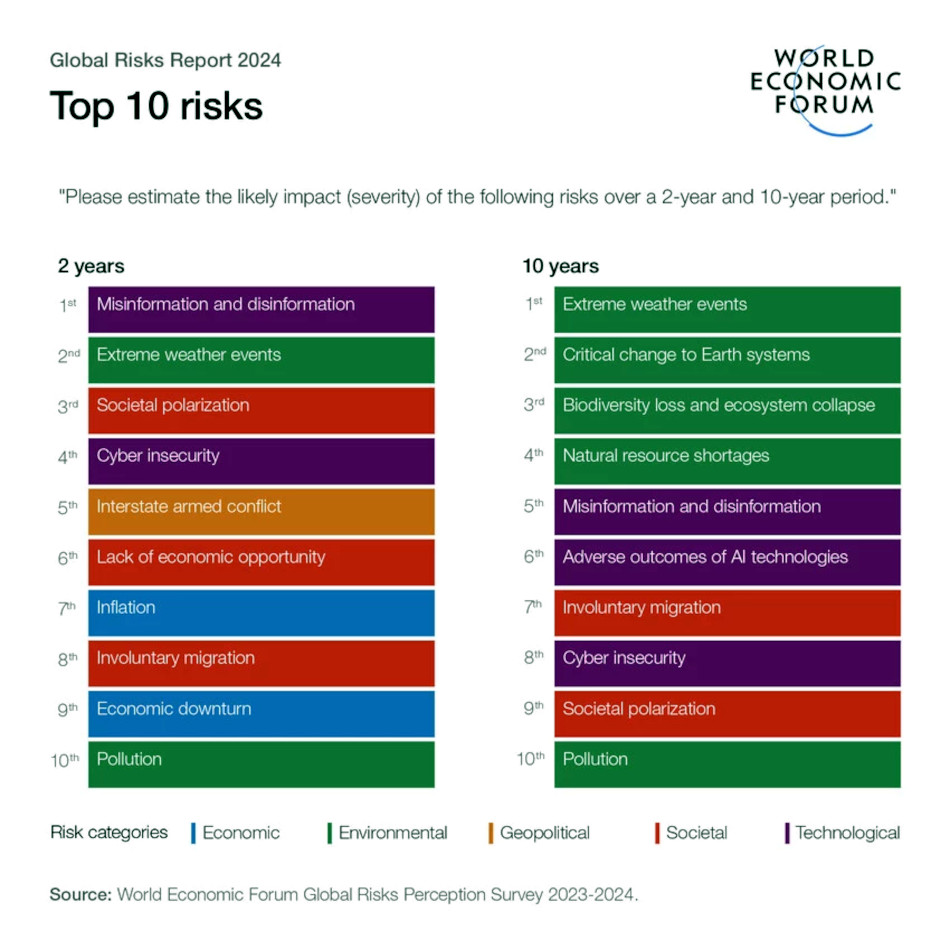The latest edition of the World Economic Forum’s annual Global Risks
Report argues that cooperation on urgent global issues could be in
increasingly short supply — highlighting the need for new approaches to
addressing risks.
Drawing on nearly two decades of original risks-perception data, Global Risks
Report 2024,
released Wednesday, warns of a landscape in which progress in human development
is being chipped away slowly — leaving states and individuals vulnerable to new
and resurgent risks. Against a backdrop of systemic shifts in global power
dynamics, climate, technology and demographics, global risks are stretching the
world’s adaptative capacity to its limit.
Two-thirds of global experts anticipate a multipolar or fragmented order to take
shape over the next decade, in which middle and great powers contest and set —
but also enforce — new rules and norms.
The 2024 report is released just ahead of the WEF’s Annual
Meeting
(Jan. 15-19) in Davos — the theme of which this year is, appropriately
enough, “Rebuilding Trust.” Produced in partnership with Zurich Insurance
Group and Marsh McLennan — the report draws on the views of over 1,400
global risks experts, policymakers and industry leaders surveyed in September
2023. Results highlight a predominantly negative outlook for the world in the
short term that is expected to worsen over the long term. While 30 percent of
global experts expect an elevated chance of global catastrophes in the next two
years, nearly two-thirds expect this in the next 10.
“An unstable global order characterized by polarizing narratives and insecurity,
the worsening impacts of extreme weather, and economic uncertainty are causing
accelerating risks — including misinformation and disinformation — to
propagate," said WEF Managing Director Saadia
Zahidi. "World leaders must come
together to address short-term crises as well as lay the groundwork for a more
resilient, sustainable, inclusive future."
Greatest global risks

Rise of disinformation and conflict
Concerns over a persistent cost-of-living crisis and the intertwined risks of
AI-driven
misinformation and disinformation, and societal
polarization
dominated the risks outlook for 2024. The nexus between falsified information
and societal unrest will take center stage amid elections in several major
economies that are set to take place in the next two years; interstate armed
conflict is a top-five concern over the next two years. With several live
conflicts under way, underlying geopolitical tensions and corroding societal
resilience are creating conflict contagion.
Economic uncertainty and development in decline
The coming years will be marked by persistent economic uncertainty and growing
economic and technological divides. Lack of economic opportunity is ranked sixth
in the next two years. Over the longer term, barriers to economic mobility could
build — locking out large segments of the
population
from economic opportunities. Conflict-prone or climate-vulnerable countries may
increasingly be isolated from investment, technologies and related job creation.
In the absence of pathways to safe and secure livelihoods, individuals may be
more prone to crime, militarization or radicalization.
Planet in peril
Environmental risks continue to dominate the risks landscape over all
timeframes. Two-thirds of global experts are worried about extreme weather
events in 2024. Extreme weather, critical change to Earth systems, biodiversity
loss and ecosystem collapse, natural-resource shortages and pollution represent
five of the top 10 most severe risks perceived to be faced over the next decade.
However, expert respondents disagreed on the urgency of risks posed —
private-sector respondents believe that most environmental risks will
materialize over a longer timeframe than civil society or government, pointing
to the growing risk of getting past a point of no return.
Responding to risks
The report calls on leaders to rethink action to address global risks —
especially urgent considering the tepid climate
agreement
reached at COP28 last month — and recommends focusing global cooperation on
rapidly building guardrails for the most disruptive emerging risks. However, it
also explores other types of action that need not be exclusively dependent on
cross-border cooperation — such as shoring up individual and state resilience
through digital-literacy campaigns on misinformation and
disinformation,
or fostering greater research and development on climate
modeling
and technologies with the potential to speed up the clean-energy transition — with
both public and private sectors playing a role.
“The world is undergoing significant structural transformations with AI, climate
change, geopolitical shifts and demographic transitions — 91 percent of risk
experts surveyed express pessimism over the 10-year horizon,” said John
Scott, Head of Sustainability
Risk at Zurich Insurance Group. “Known risks are intensifying and new risks are
emerging — but they also provide opportunities. Collective and coordinated
cross-border actions play their part, but localized
strategies
are critical for reducing the impact of global risks. The individual actions of
citizens, countries and companies can move the needle on global risk reduction —
contributing to a brighter, safer world.”
Get the latest insights, trends, and innovations to help position yourself at the forefront of sustainable business leadership—delivered straight to your inbox.
Sustainable Brands Staff
Published Jan 11, 2024 8am EST / 5am PST / 1pm GMT / 2pm CET